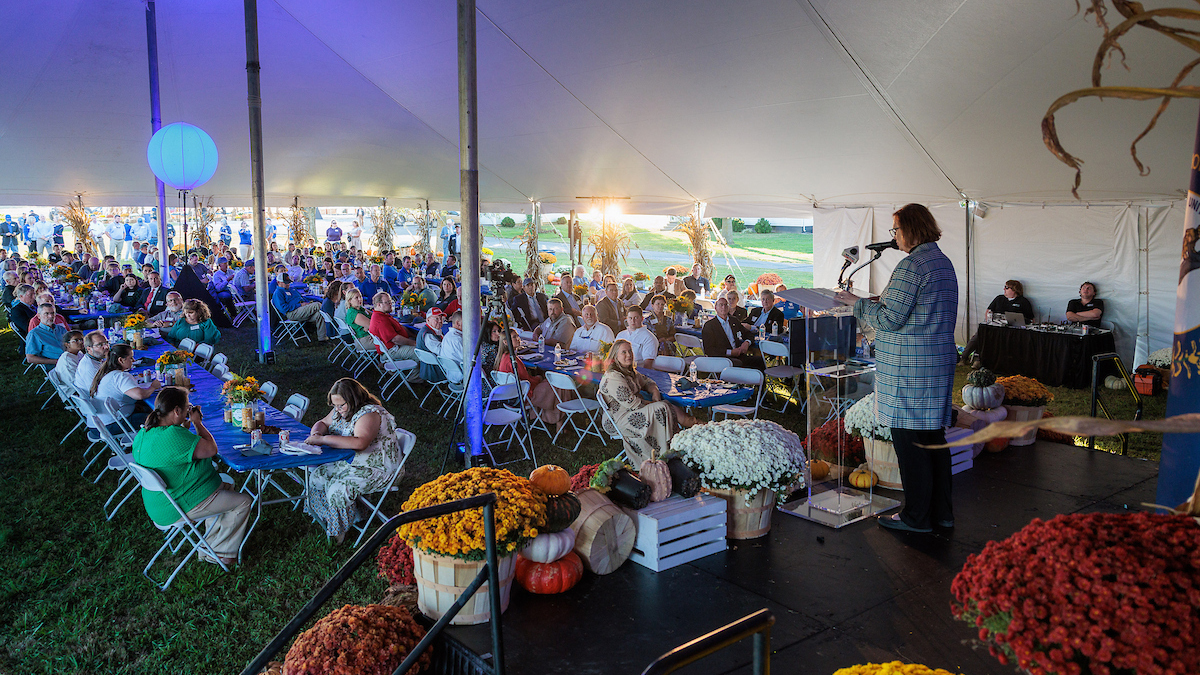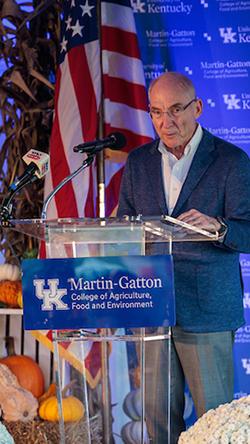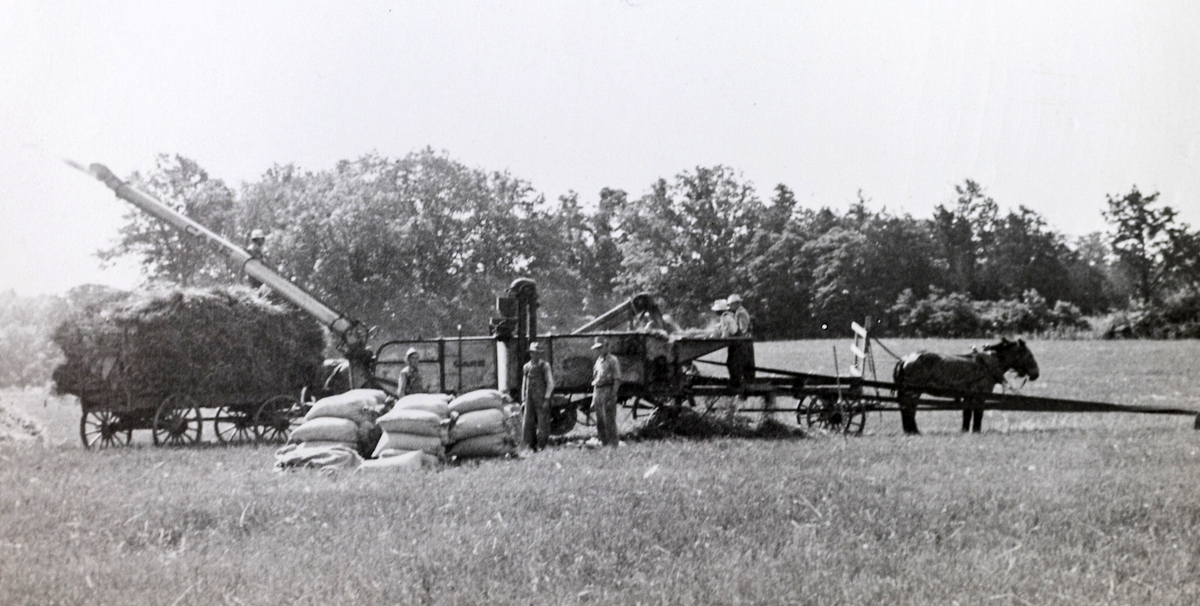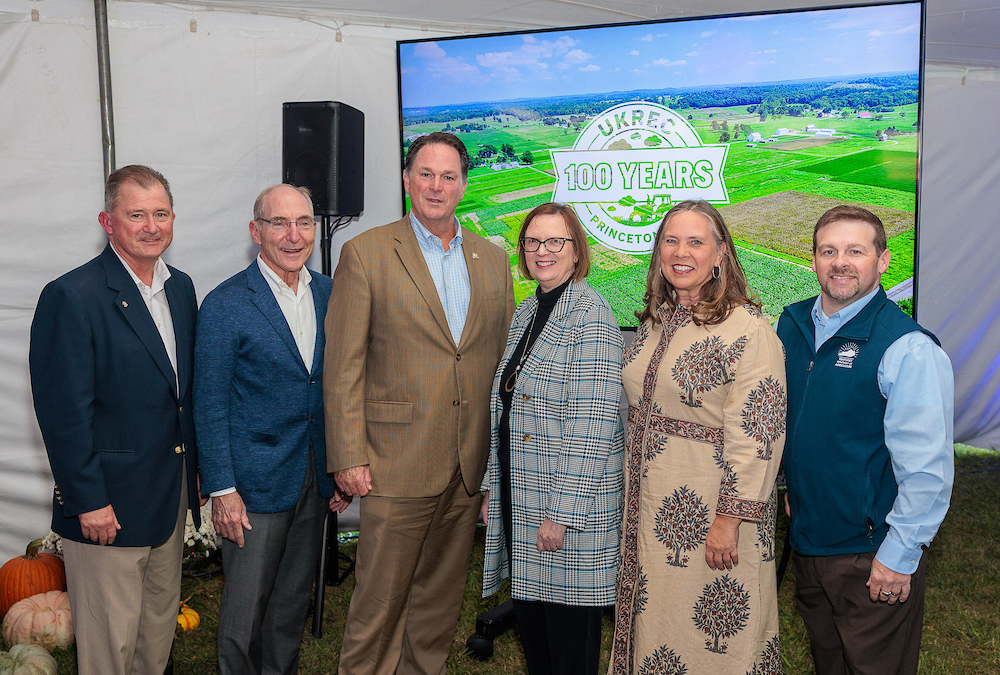100 years of innovation and service: UK Research and Education Center celebrates its impact and resilience
100 years of innovation and service: UK Research and Education Center celebrates its impact and resilience


A century of global innovation, education and community partnership was celebrated yesterday as the University of Kentucky Research and Education Center (UKREC) marked its 100th anniversary with a commemorative event at its new facilities in Princeton, Kentucky.
The celebration honored the legacy of the station’s founding in 1925 and its enduring impact on Western Kentucky farming communities and global agricultural practices.
Founded on 400 acres donated by local farmers and community leaders, UKREC has grown into a 1,652-acre hub of scientific advancement and outreach. The centennial event brought together producers, research faculty, Extension agents, alumni and state officials to reflect on the substation’s rich history and look ahead to its future.

“For a century, the Princeton research farm has been advancing Kentucky and the globe. As a leader in agricultural innovation, the farmers and families of Western Kentucky have served as the cornerstone for pioneering resilient agricultural communities, farming methods and Kentucky heritage,” said University of Kentucky President Eli Capilouto. “As we celebrate the 100-year milestone and reflect on the community that has stewarded the UK Research and Education Center at Princeton, I am inspired by what the Princeton research farm has made possible for Kentucky and her people. I look forward to all the ways it will continue to advance our Commonwealth, upholding a promise more than 160 years old.”
“UKREC is a model of land-grant engagement: listening first, co-creating solutions in our Princeton fields, and sharing knowledge so others don’t carry the risk alone,” said Laura Stephenson, vice president for land-grant engagement and dean of the UK Martin-Gatton College of Agriculture, Food and Environment. “That spirit of collaboration is what has made this place so impactful for a century — and will carry it forward for the next.”
A legacy rooted in community
The idea for an agricultural experiment farm in Western Kentucky emerged in the early 1920s, driven by the region’s need for improved farming methods and advanced scientific agricultural research. This was the same time timber baron E.O. Robinson offered a 15,000-acre tract of land in Eastern Kentucky for an experiment station.
While sites in Paducah and Mayfield were suggested, Caldwell County Extension agent H.D. Triplett advocated for Princeton because of its central location and diverse soil types.
In 1924, the Kentucky General Assembly approved funding for the substation, contingent on local citizens purchasing and donating the land. With overwhelming support, families, schools and civic leaders rallied to raise the funds, and the West Kentucky Sub-experiment Station officially opened on Labor Day, Sept. 7, 1925. The dedication ceremony attracted more than 12,000 attendees, and according to newspaper articles written about the event, it was the largest public event recorded in the area.

Transforming Western Kentucky agriculture
From its earliest days, UKREC has been a catalyst for agricultural transformation. Its research has shaped farming practices across the region and beyond, with landmark contributions to no-till farming, double-crop systems, integrated pest management and soil reclamation. The substation’s work in dark-fire tobacco, fruit production, beef cattle nutrition and forage systems has helped Kentucky producers remain competitive and sustainable.
UKREC’s commitment to education has been equally impactful. Through field days, workshops and Cooperative Extension programming, the substation reaches thousands of farmers annually, equipping them with the latest research and practical tools to improve their operations.
Princeton-based farmer Trevor Gilkey has attended many of the UKREC meetings and field days over the last 40 years, beginning as a tag-along with his father. He said he developed strong relationships with the faculty and staff, as they were always happy to answer his questions or test new techniques on his farm.
“They were a big help not just to me but to a lot of people,” said Gilkey. “They seem to do a good job of staying up on the latest technology. It’s just a constant learning cycle for those of us in agriculture, so they have been a blessing for me personally. They’ve always gone the extra mile.”
UKREC has long attracted top-tier agricultural scientists and educators. In the 1960s and 1970s, Dean Charles Barnhart expanded the staff, fostering interdisciplinary collaboration that continues today. The substation currently employs 65 full-time faculty and staff across nine units and houses the UK Grain and Forage Center of Excellence, established in 2019 to position the university as a global leader in addressing modern agricultural challenges.
Resilience and renewal
The 2021 tornado that devastated much of UKREC’s infrastructure was a defining moment in the substation’s history. Despite the destruction, their mission endured. More than 200 research projects continue, and rebuilding efforts have transformed UKREC into a more advanced institution, one that is ready to meet the demands of today’s agricultural climate.
“As Kentucky farmers face increasing pressure to produce more with fewer inputs and navigate complex technologies and weather patterns, UKREC is adapting to address new needs with updated facilities,” said Carrie Knott, Extension grains specialist and UKREC managing director. “The tornado was a setback, but we’re as dedicated as ever to supporting Kentucky agriculture.”
Before the celebration, faculty, staff and UKREC stakeholders toured the farm and viewed the new construction projects. All buildings and structures are expected to be completed by 2026.
“After the devastating 2021 tornado, it’s been inspiring to see the UK Research and Education Center not just rebuild, but rebuild with a plan,” said Murray Sen. Jason Howell, chair of the Senate Agriculture Committee. “The old facility had grown and changed over the years without a real roadmap, but what’s been built back is intentional, more functional and designed for the future. They’ve come back stronger, with cutting-edge research facilities and the same deep commitment to serving Kentucky’s farm families. The legislature was proud to invest $9 million through the SAFE Fund to help make that vision a reality.”
“Since its establishment in 1925, UKREC has been at the forefront of agricultural research, not only serving the farmers of Western Kentucky but also making significant contributions to global agricultural practices. From pioneering no-till farming methods to advancing livestock health and crop management, the impact of UKREC's work resonates far beyond our borders,” said Owensboro Rep. Suzanne Miles, majority caucus chair.
For more information on UKREC’s history, impact and the centennial celebration, visit https://ukrec.mgcafe.uky.edu.

# # #
By Jennifer Elwell, jennifer.elwell@uky.edu
The Martin-Gatton College of Agriculture, Food and Environment is an Equal Opportunity Organization with respect to education and employment and authorization to provide research, education information and other services only to individuals and institutions that function without regard to economic or social status and will not discriminate on the basis of race, color, ethnic origin, national origin, creed, religion, political belief, sex, sexual orientation, gender identity, gender expression, pregnancy, marital status, genetic information, age, veteran status, physical or mental disability or reprisal or retaliation for prior civil rights activity.
Events Extension Research
